 Research Update
Research Update
27
DecOn December 26, 2018, “Roundtable: 40 Years of China-U.S. Relations and Public Diplomacy” was successfully held at Renmin University of China (RUC). This roundtable was jointly organized by National Academy of Development and Strategy, RUC (NADS) and China.com.cn, and co-organized by Institute of Public Diplomacy, RUC. He Yaomin, Vice President of RUC, and Wang Xiaohui, Editor-in-Chief of China.com.cn, addressed the roundtable respectively, and Wang Lili, Deputy Dean of NADS on behalf of the organizers presided over the event.
The roundtable coincided with the run-up of the 40th anniversary of the establishment of formal diplomatic relations between China and the United States, which will fall on January 1, 2019. Over the past 40 years, China-U.S. relations keep forging ahead all along and move forward despite all the twists and turns. As the world is undergoing the most complicated and fundamental changes since the end of the Cold War, China-U.S. relations also face an unprecedented challenge. On December 1, 2018, Heads of both sides met and agreed to move forward China-U.S. relations on the basis of coordination, cooperation and stability, sending positive signals of pursuing win-win cooperation in spite of all the problems. However, China and the U.S. are faced with a number of burning problems and divergences. At such a historical junction and time node, NADS and China.com.cn co-hosted the roundtable.
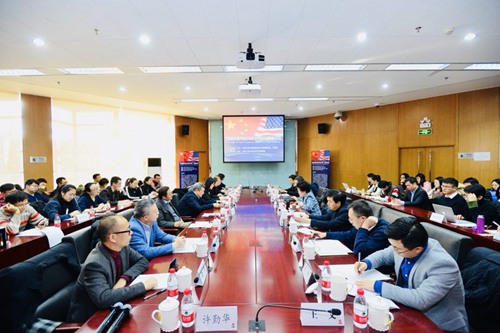
The roundtable invited over 20 experts and scholars engaged in the study and practice of China-U.S. relations and public diplomacy from such organizations as China Center for International Economic Exchanges (CCIEE), RUC, Tsinghua University, Peking University, China Academy of Social Sciences (CASS), China Foreign Affairs University (CFAU), China Institutes of Contemporary International Relations (CICIR), American Academy of Shanghai, Jinan University and Shanghai University of Finance and Economics (SUFE) for discussions and exchanges. These experts delved into issues like “The Functions, Problems and Solutions of China-U.S. Multiple-track Public Diplomacy” and “Historical Experience, Challenges and Opportunities of China-U.S. Relations”, among others.
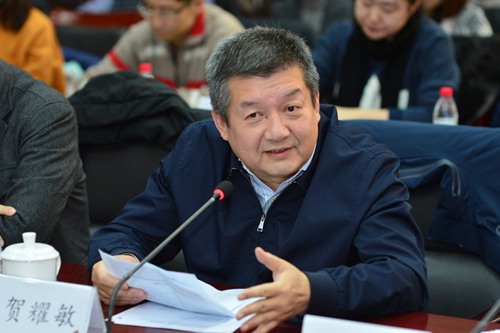
Prof. He Yaomin, Vice President of RUC, stated in his speech that “Roundtable: 40 Years of China-U.S. Relations and Public Diplomacy” was an important academic conference at the critical moment of a huge setback in China-U.S. relations in the contemporary era and was therefore of unique value and significance. He expects to envisage key problems between China and the U.S. through this roundtable and actively maintain and push coordinated, cooperative and stable development of China-U.S. relations in the spirit of ensuring the development of China and the U.S. and putting forward innovative ideas and suggestions. 40 years ago, the establishment of China-U.S. diplomatic relations reshaped the world situation and from then on, both China and the U.S. have experienced profound changes, with China having risen from a relatively poor and backward country to the world’s second largest economy and the U.S. having maintained 40 years of prosperity. Meanwhile, China-U.S. relations represent a combination of opportunities and challenges all the time: on the premise of common interests and mutual needs, the two are partners while a crisis will often appear for reason of conflicts of interests and disagreements on appeals. It must be clearly understood that contradictions and conflicts between China and the U.S. will exist for a long time, but consultation and cooperation will not be interrupted and we are pressing for shaping a responsible great power image of maintaining peace, cooperation, development and win-win results in a variety of effective ways, including pursuing multiple-track public diplomacy, so as to ensure successful implementation of national and diplomatic strategies and accomplishment of the great rejuvenation of the Chinese nation. The academic circle of China should guide China-U.S. relations to develop in the right direction and promote stable long-term development of China-U.S. relations by offering innovative and constructive ideas and views. This is an indispensable duty of NADS which is a national high-end think tank in China.
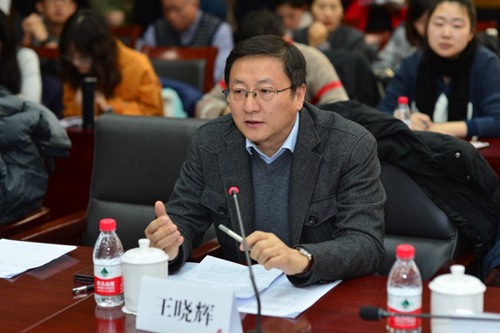
Wang Xiaohui, Senior Editor of China.com.cn, stated in his speech that China has made enormous achievements over the 40 years of the reform and opening up, with great strides in China-U.S. relations and extensive common interests and huge room for cooperation between China and the U.S. Today, as 40 years have elapsed, we again stand at the crossing of the times where the global balance of power has greatly changed, the existing international system been heavily impacted and power games, uncertainties and instabilities constantly increased. In particular, the past year has witnessed complex changes in China-U.S. relations. The two nations will usher in the 40th anniversary of the establishment of their diplomatic relations in 2019. As the saying goes, one will not be confused by the outside world at 40 and he expects that the experts can offer their insights into coordinated, cooperative and stable development of China-U.S. relations in China’s position on a global scale via this roundtable.
Session 1 of the roundtable started with a discussion themed “The Functions, Problems and Solutions of China-U.S. Multiple-track Public Diplomacy”. Wang Lili, Deputy Dean of NADS, chaired the discussion. Experts involved in the discussion include Chen Wenling, Chief Economist of CCIEE, Zhao Kejin, Deputy Dean of School of Social Sciences, Tsinghua University, Xu Qinhua, Deputy Dean of NADS, Yuan Zheng, Director of Department of American Diplomacy of Institute of American Studies, CASS, Wang Dong, Deputy Director of Institute for China-US People-to-People Exchange, Peking University, Chen Dingding, Professor of School of International Studies, Jinan University, and Zhou Qingan, Deputy Dean of School of Journalism and Communication, Tsinghua University.

NADS Deputy Dean Wang Lili stated that public diplomacy aimed at strengthening understanding and mutual trust and preventing misunderstandings or misjudgments. Over the past 40 years since China and the U.S. officially established diplomatic relations, multiple-track public diplomacy plays a key role in promoting the understanding and mutual trust between the two sides. Recently, China-U.S. relations have encountered twists and turns in the development, together with challenges and uncertainties. However, historical experience suggests that only cooperation is the most correct choice for both China and the U.S. and in the best interests of the two peoples and global stability, so China and the U.S. should seek all possible room for cooperation in competition to ensure healthy and stable development of China-U.S. relations. Strategic circles of both China and the U.S. should maintain rational ideological communication, continue to strengthen multiple-track public diplomacy and have a deep understanding of the other’s concerns by intensifying listening and dialogue.

Chen Wenling, Chief Economist of CCIEE stated in her speech that history offered a rare opportunity for public diplomacy which should play a critical role in promoting China-U.S. relations. On the one hand, China may directly participate in strategic games with the U.S. in all aspects in a subtle manner, but the effects on each other will be apparent. On the other hand, we should be confident in public diplomacy, dare to compete with the U.S. with an attitude of being neither aggressive nor timid and act on just grounds by putting national interests first. At last, public diplomacy should also be academically sound and professional and guide public opinions based on in-depth analyses and studies.
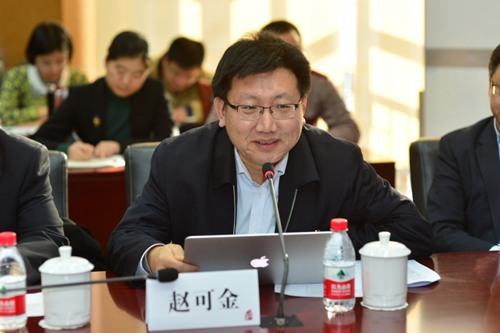
Zhao Kejin, Deputy Dean of School of Social Sciences, Tsinghua University, pointed out that changes in China-U.S. relations over the past 40 years can be viewed in two dimensions, namely elites and the public. For elites in the U.S., China-U.S. relations have changed greatly from strategic contact to strategic competition. Chinese elites have also different views, with some arguing that China should develop by learning a western or American model and others believing that China should embark on its own path and insist on Chinese characteristics and China model. For the public of both China and the U.S., no substantial changes are observed in the understanding of China-U.S. relations. A Chicago Council on Global Affairs (CCGA) opinion poll shows that American people maintain a similar view of China to that 30 years ago. According to the poll, American people scored 44 points for China in 1978 while the score is 45 points today. Relatively stable public opinions in both China and the U.S. lay a certain foundation for future development of China-U.S. relations.
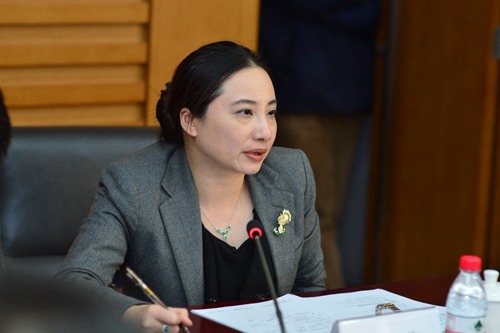
NADS Deputy Dean Xu Qinhua suggested that scholars should actively give a voice to their opinions on some major international events and issues, which should be an important dimension of public diplomacy. How scholars maintain objectivity and neutrality when participating in public diplomacy to promote and protect national interests whilst persuading other countries reasonably remains one of our research tasks. Cooperation in liquefied natural gas is a lubricant for China-U.S. relations and China and the U.S. have common interests in the trading mechanism for staple commodities, so a lot of energy diplomacy issues merit scholars’ attention and intensive study.
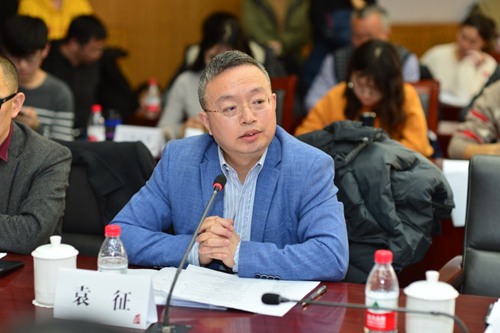
Yuan Zheng, Director of Department of American Diplomacy of Institute of American Studies, CASS, stated that we have accumulated a lot of successful experience in public diplomacy over the past four decades, together with many lessons learned. We should do what we have to do and maintain prosperity of our country, ethnic unity and social harmony and stability. China-U.S. public diplomacy should be promoted on an objective and rational basis, without overstressing nationalist or anti-American sentiment. Also, we should energetically boost cultural and people-to-people exchanges between China and the U.S.
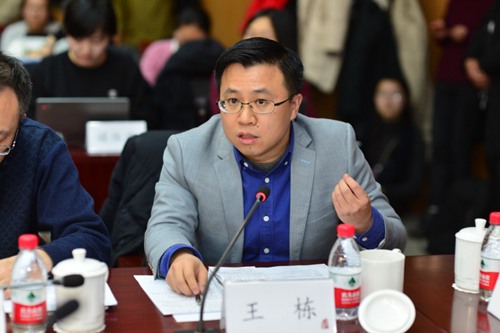
Wang Dong, Deputy Director of Institute for China-US People-to-People Exchange, Peking University, believes that despite quite a few challenges and obstacles at present, China-U.S. cultural and people-to-people exchanges have become one of the three pillars of China-U.S. relations after years of efforts. In the U.S., Chinese language education has been developing on a solid public foundation. Next, we should consider how to further promote trust and friendship between the two peoples, strengthen the toughness and depth of Chine-U.S. relations and build the groundwork for bilateral relations through public diplomacy, including Chinese language education, so that public diplomacy can become an important way of boosting non-governmental exchanges and consensuses between the two.

Prof. Chen Dingding from School of International Studies, Jinan University, said that new challenges had occurred in China-U.S. public diplomacy, to which China could respond in two aspects. Firstly, China may “deal with the U.S. beyond the U.S.”, which means it can have indirect effects on U.S. national strategy and public opinions by strengthening ties with countries and organizations like Mexico, Canada and the EU; secondly, China should not only pay attention to the U.S. attitude and issues at the national level, but also have targeted exchanges and cooperation with respect to issues concerned by different states there.
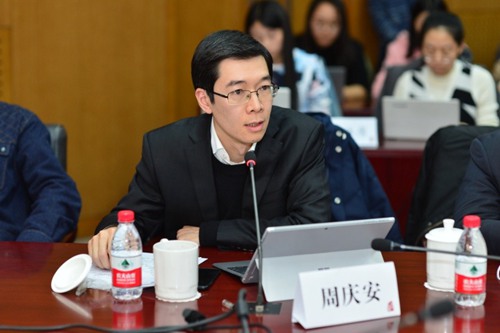
Zhou Qingan, Deputy Dean of School of Journalism and Communication, Tsinghua University, stated that China-U.S. public diplomacy played a key role in different stages of China-U.S. relations and faced three problems in the new historical stage: how to hedge against anxiety, how to build strategic certainty and how to create a community with a shared future or circle of our friends. China’s public diplomacy should go beyond the traditional discourse system and become more practical; and actions should be taken to break the traditional mode of public diplomacy and establish an extensive-to-intensive new mode and architecture; explore new targets of public diplomacy; and effectively build a new bridge between decision-making and public opinions.
Session 2 is a discussion themed “Historical Experience, Challenges and Opportunities of China-U.S. Relations”, which was presided over by Wang Wen, Executive Dean of Chongyang Institute for Financial Studies, RUC. Experts involved in this discussion include Huang Renwei, President of the American Academy of Shanghai, Jia Guoqing, Professor of School of International Relations, Peking University and member of Foreign Affairs Committee of Chinese People’s Political Consultative Conference (CPPCC), Fang Ning, Director of Institute of Sociology, CASS, Shi Yinhong, Professor of School of International Relations, RUC, Wang Fan, Vice President of CFAU, Jia Wenshan, Distinguished Professor of School of Journalism and Communication, RUC, Wang Wenfeng, Chief Editor of Contemporary International Relations at CICIR, and Yu Zhi, Deputy Director of Department of World Economy and Trade, SUFE.
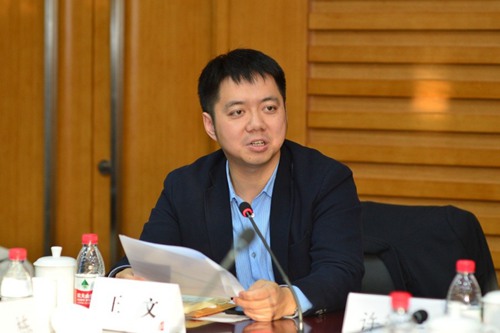
Wang Wen, Executive Dean of Chongyang Institute for Financial Studies, RUC, stated that the primary global contradiction had been the fall of the United States at a certain extent and certain power vacuum in the world order over the past two years. China should not focus on its trade competition with the U.S.; instead, it should pay more attention to deepening the reform at home. In spite of all the crises and competitions between China and the U.S., there is great room for cooperation, which is the general situation that has not been fundamentally changed. Trade between China and the U.S. might still increase this year and there are still a large number of Confucius institutes although several have been closed down, so some adjustments based on the situation will create conditions for China’s development. China should maintain a great power mentality as it becomes stronger.
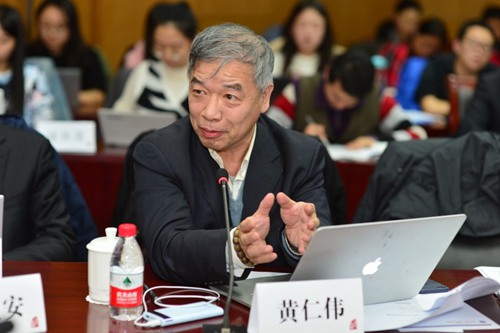
Huang Renwei, President of the American Academy of Shanghai, suggested that we should have a correct understanding of the current China-U.S. relations based on our historical experience. In 1949, the U.S. organized an important debate titled “Who Lost China?” over policies towards China. With rapid development of China’s economy, the U.S. is experiencing “losing China” a second time and this time might mean “losing the world”. As the balance of power between China and the U.S. concerns the “fate” of the U.S., China can hardly reach a broad consensus with the U.S. through traditional public diplomacy, but has to act on a “multi-pronged” basis: not only communicating with American think tanks, but also exchanging with the general public in the U.S.; finding out pain points of the U.S. in consensus propaganda; giving more voice to Americans who believe in objective facts; firmly insisting on liberalism and multilateralism and preventing the reappearance of McCarthyism.

Jia Qingguo, member of Foreign Affairs Committee of CPPCC, believes that the development of China-U.S. relations obeys the following law: “giving comes before receiving”, which means that the two will be friends if they take into account each other’s interests, or they will be enemies. As the saying goes, “a real gentleman will only gain his wealth in a right way”; behaving oneself and obeying rules are the foundation of China-U.S. relations. “Do as you would be done by others”, so respecting the other’s interests and desires is the precondition to benign development of bilateral relations.

Prof. Shi Yinhong from School of International Relations, RUC believes that from a historical perspective, the current competition between China and the U.S. is quite severe if it is compared with that between Britain and Germany in history. A key reason for such a tension is that the rise of an emerging country makes an established power anxious and vigilant.
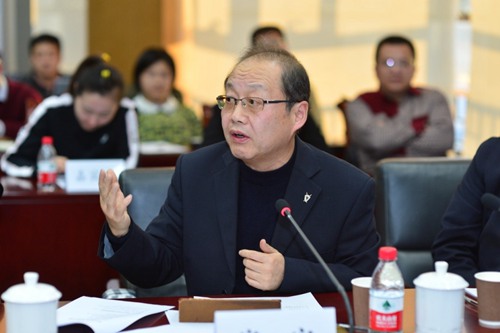
Fang Ning, Director of Institute of Sociology, CASS, pointed out that the development of human society resembled the evolution of the earth. The earth evolution has been either dramatic or impeded over the past billions of years; similarly, human society has experienced either earthshaking or subtle development. Since the beginning of the new century, the world seems to encounter a new wave as apparent fluctuations occur in China-U.S. relations in recent years. He believed that leaders of the two countries could seize historical opportunities to facilitate healthy development of their bilateral relations.

Wang Fan, Vice President of CFAU, deems that we should not overlook international responsibilities that China and the U.S. should undertake. Confrontations between China and the U.S. could cause not only a lose-lose situation, but also uncertainties. A review of the history shows that China has been actively promoting positive development of China-U.S. relations, especially in frictions. In future, both Chinese and American scholars should recognize that China-U.S. relations have come to a new stage and it is an inexorable trend to give up illusions and seek cooperation in competition. Moreover, we have to continue to insist on win-win cooperation, seek strategic consensus and further strengthen mutual learning.

Jia Wenshan, Distinguished Professor of School of Journalism and Communication, RUC, believed that China-U.S. relations have undergone several stages since the reform and opening-up. The first stage features limited cooperation, when the two sides gradually expanded cooperation from scratch; the second stage features deterrence-based diplomacy during the reign of Obama; the third stage features a series of competitions launched by the U.S. against China since Trump took office, showing the transformation from deterrence to containment on the U.S. side. Facing strategic adjustments made by the U.S., China should pursue certain competition and anti-containment based on emphasis on cooperation. Meanwhile, it should mitigate the anxiety of U.S. elites through public diplomacy.
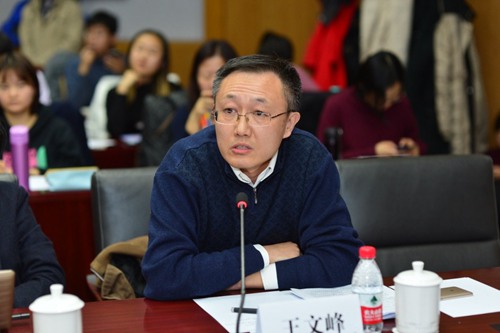
Wang Wenfeng, Chief Editor of Contemporary International Relations at CICIR, stated that there is a difference in the understanding of China-U.S. relations in America. In short, American people have a not-so-bad impression of China-U.S. relations. As the China hand Jeffrey A. Bader said, “The grassroots in the U.S. have no strong sense of competition against China”. He believes this will be a normal in future. Anxiety or negative attitudes often belong to elites who tend to consider China-U.S. relations strategically. But for common people in the U.S., they care about daily life and consider China as a partner in economy, trade and daily life to some extent. We should recognize the limit of China-U.S. strategic competition on the one hand and should not neglect the severity of the same. Further, we should try to avoid cut-throat strategic competition with the U.S.
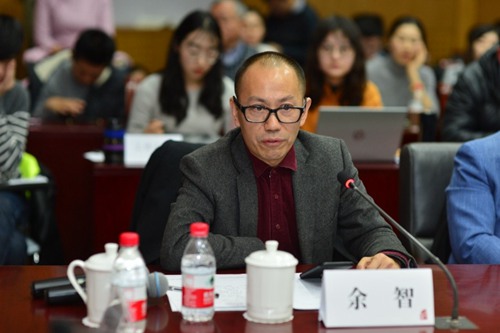
Yu Zhi, Deputy Director of Department of World Economy and Trade, SUFE, stated that China-U.S. negotiations are underway and it is possible for both sides to compromise for the purpose of maintaining stable China-U.S. relations based on public media reports and relevant studies. Adjustments and reforms made by China in its foreign trade policy and industrial policy are not only the requirement of solving China-U.S. trade frictions, but also conform to the national long-term sustainable industrial strategy.
National Academy of Development and Strategy, RUC (NADS) was selected into first batch of “China Top Think Tanks” pilot units and into Global Top 100 Think Tanks, and ranked No.1 in the “Top 100 University Think Tanks” at the beginning of 2018. NADS focuses on three core research fields, namely economic governance and economic development, political governance and rule of law construction, social governance and social innovation, has set up more than 20 research centers and has in place an established high-level research team. In 2017, NADS expanded the local cooperation network for national high-end think tanks and set up Yibin Branch (The Yangtze River Economic Belt Research Institute) and Qingdao Branch, marking major progress in university-local authority cooperation. Bearing mission of the times, NADS is committed to developing into a “world’s first-class university think tank that knows China best”.